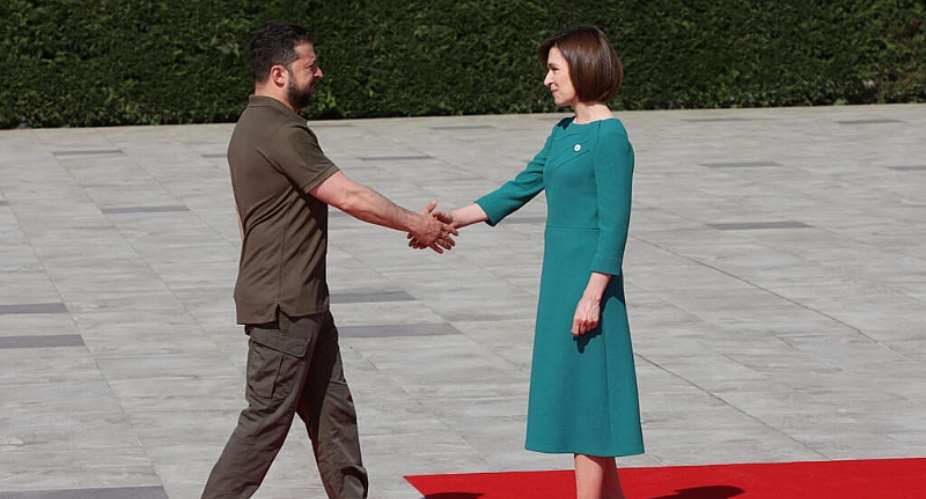European leaders are gathering in Moldova on Thursday in a show of diplomatic force designed to put pressure on Russia. It is also an opportunity for Moldova to drum up support for its bid to join the European Union.
Moldova's President Maia Sandu is hosting the leaders at the second summit of the European Political Community (EPC) in Bulboaca.
The EPC groups 27 EU members with 20 of their European allies. It excludes Russia and Belarus.
Sandu began by thanking Ukraine's President Volodymyr Zelensky, who was first to arrive.
"Ukraine keeps Moldova safe today, and we're very, very grateful for that," Sandu said.
For the other leaders she had another message: "Please do invest in our countries. Please do believe in our democracies, and in our EU future.
"This is your contribution to the stability and peace on the continent."
'Moldova is Europe'
In turn, Zelensky thanked Sandu and the people of Moldova, and said Ukrainians were happy to stand "shoulder to shoulder" with them as they seek security guarantees from Europe.
Both Ukraine and Moldova hope to start EU membership talks this year, despite Russia's ongoing invasion of Ukraine and alleged attempts to undermine Moldova's sovereignty.
Sandu has already received support from European Commission president Ursula von der Leyen, who hailed Moldova's "big progress" in making reforms requested by the EU.
"Moldova is at the heart of Europe. Moldova is Europe. And today and tomorrow, the whole of Europe is Moldova," von der Leyen said on the eve of the summit
The EPC gathering is being held under tight security, just 10 kilometres from the breakaway Moldovan region of Transnistria, which is occupied by Russian "peacekeepers".
Need for unity
France's President Emmanuel Macron, who first promoted the EPC, said that Ukraine's forces battling Russian invaders in the east and south of their country were "protecting Europe".
"We must also think of a wider Europe," he told reporters in Bratislava on the eve of the summit.
"We must think of our Europe not simply from a security point of view within the framework of NATO and not simply within the framework of the European Union."
And he said the allies should find a way to offer "tangible and credible security guarantees to Ukraine" while the eventual questions of EU and NATO membership are pending.
British Prime Minister Rishi Sunak, whose country left the European Union but remains in NATO, said that "Putin's utter contempt for other countries' sovereignty" showed the need for unity.
"We cannot address these problems without Europe's governments and institutions working closely together," he said.
Chance to address conflicts
Although not much time has been set aside for a general group discussion, diplomats hope side meetings will deal with practical issues – including tensions between neighbours.
Macron and Germany's Chancellor Olaf Scholz are to mediate a meeting between Armenia's Prime Minister Nikol Pachinian and Azerbaijan's President Ilham Aliyev.
Armenian and Azerbaijani leaders have fought for decades over the disputed territory of Nagorno Karabakh, but both sides have been invited to the EPC as Washington and Brussels push for a peace deal.
Another long-standing European conflict, the standoff between Serbia and Kosovo, will also be on the agenda.
Leaders of the two countries are under pressure to dial down tensions, which broke into violence anew this week.
(with AFP)





 Critics fear Togo reforms leave little room for change in election
Critics fear Togo reforms leave little room for change in election
 Flooding: Obey weather warnings – NADMO to general public
Flooding: Obey weather warnings – NADMO to general public
 Fire in NDC over boycott of Ejisu by-election
Fire in NDC over boycott of Ejisu by-election
 NDC to outdoor Prof Jane Naana Opoku-Agyemang as running mate today
NDC to outdoor Prof Jane Naana Opoku-Agyemang as running mate today
 Ejisu: CPP seeks injunction to stop April 30 by-election
Ejisu: CPP seeks injunction to stop April 30 by-election
 Dismiss ECG, GWCL, GACL bosses over losses – United Voices for Change tells gov’...
Dismiss ECG, GWCL, GACL bosses over losses – United Voices for Change tells gov’...
 Submit 2023 audited financial statements by May – Akufo-Addo order SOEs
Submit 2023 audited financial statements by May – Akufo-Addo order SOEs
 Current power outages purely due to mismanagement – Minority
Current power outages purely due to mismanagement – Minority
 ECG hoists red flag to fight Ashanti Regional Minister over arrest of General Ma...
ECG hoists red flag to fight Ashanti Regional Minister over arrest of General Ma...
 Mahama’s 24hr economy will help stabilise the cedi; it’s the best sellable polic...
Mahama’s 24hr economy will help stabilise the cedi; it’s the best sellable polic...
